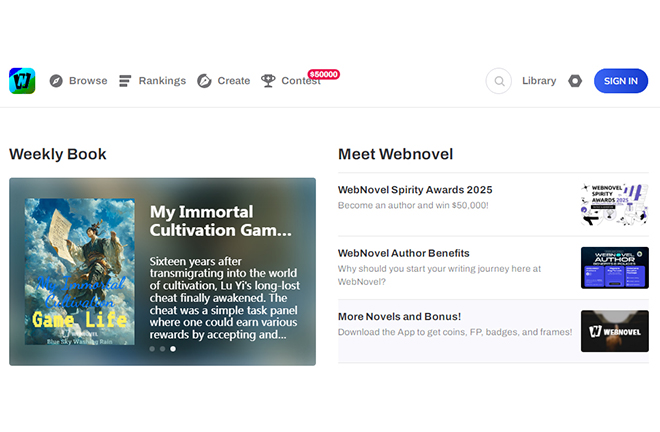Online literature enriches new popular literature and art

FILE PHOTO Webnovel is the international version of Qidian, one of China's leading platforms for original online literature.
Compared with traditional popular literature and art, the “new popular literature and art” places greater emphasis on interactivity and entertainment, with modes of expression more closely aligned with the digital nature of contemporary life. Evolving in step with this trend, online literature leverages new technologies to develop its distinctive features, offering contemporary readers a rich variety of reading options and aesthetic experiences.
Reinvention rather than repetition
The democratization of creative authorship is a distinctive characteristic of the new popular literature and art. With the emergence of user-generated content, an increasing number of non-professionals are participating in content creation, leading to an exponential growth in literary and artistic works as well as heightened sensitivity to popular aesthetic preferences. Platform traffic distribution and personalized recommendation algorithms, powered by big data technology, enable efficient matching between content and audience, while publicly available metrics such as click-through rates and bookmark counts provide clear indicators of what themes or techniques resonate most. While such responsiveness to market trends keeps content fresh, it can also lead to homogenization. In practice, however, online literature rarely engages in endless mechanical repetition. Today, its vitality increasingly stems from a process of ongoing “rewriting.”
Here, “rewriting” refers to creative reinvention. All creative endeavors—whether consciously or unconsciously—draw upon or imitate their predecessors. Online literature, with its vast repository of existing works, simply takes this further. Authors typically adopt strategies such as deconstruction, recombination, and superimposition to blend key elements from earlier works—world-building, supernatural systems, character archetypes—with new components, creating a sense of novelty without deviating from readers’ habitual expectations.
This approach is exemplified by Ten Days Till the End and I Am Not a Drama God, both selected for the 2024 China Writers Association’s Online Literature Support Program. The former blends multiple genre elements including the “infinite style,” suspense, mystery, and apocalypse survival, while the latter fuses traditional Chinese opera with popular tropes such as post-apocalyptic settings, time travel, and urban wuxia. Such hybrid compositions illustrate that online literature is not just rewriting specific genres, but also redrawing the boundaries between them.
Riding the wave of digital media
Another hallmark of the new popular literature and art—including online literature—is its reliance on emerging media platforms for both creation and dissemination. While large commercial literary websites focused on long-form serialized fiction continue to expand their reach, many platforms originally designed for social networking or other purposes have begun to host online literary content. These platforms accommodate diverse formats and lengths—including audio, video, and multimedia. In addition to traditional long, medium, and short works, micro-fiction and short prose have gained considerable popularity. This is partly a response to the fast pace of contemporary life, which makes sustained, long-term reading difficult for many, and partly due to platform constraints on length and format.
Online literature’s ability to expand the boundaries of popular culture owes much to Generation Z and Generation Alpha authors, who frequently draw inspiration from animation, film, video games, and other art forms. As digital natives, these younger generations are quick to embrace new technologies. They move beyond abstract text-based reading to actively explore innovative, forward-looking modes of reading and writing. Some authors, for instance, create supplemental materials such as appendices, audio clips, and illustrations, requiring readers to engage with both the main text and the “paratext” to fully grasp the work. Interactive novels, heavily influenced by video games, offer immersive reading experiences. Other works, though composed entirely in text, boldly experiment with metafiction, nonlinear narrative, and other unconventional techniques.
In conclusion, while online literature often exhibits avant-garde and experimental qualities, it is neither entirely unfamiliar nor gratuitously novelty-seeking. Rather, it builds upon existing literary and artistic traditions while fostering a strong sense of participation and immersion to spark public interest in reading, thereby embodying the principle of “serving the people through literature and art.”
Zhou Zhixiong (professor) and Xu Xiaofei are from the College of Liberal Arts at Anhui University.
Edited by WANG YOURAN
